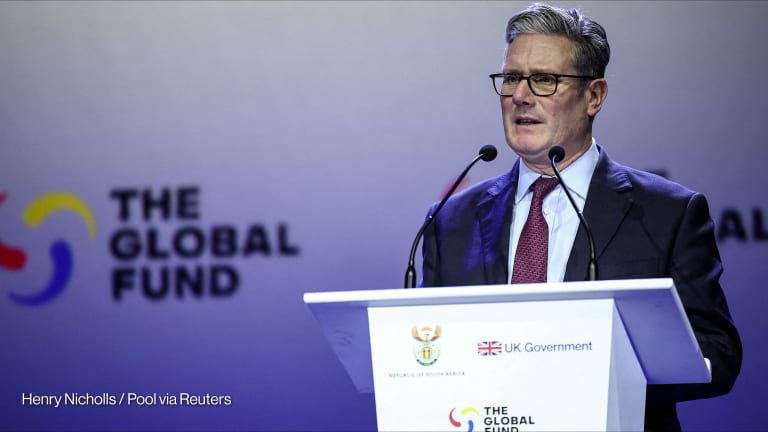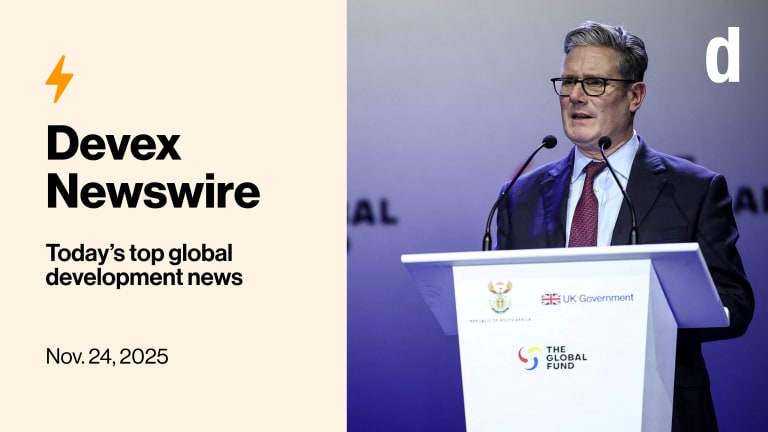
The Global Fund to Fight AIDS, Tuberculosis and Malaria fell short of hitting its $18 billion replenishment target as two of its major donors failed to make pledges Wednesday.
Despite some new donors coming to the table and a range of countries — from Malawi to France — significantly increasing their contributions, the Global Fund failed to raise the minimum amount of funding it hoped to raise for the next three years. Even if the United Kingdom and Italy announce contributions in the coming weeks, it’s unlikely to get the tally over the line, and that left some people wondering what happened after the pledging event wrapped up.
The Global Fund said that the $18 billion would support programs that could save 20 million lives, avert 450 million new infections and strengthen health systems and resilience.
The final tally of $14.25 billion slightly exceeded the amount raised in the last Global Fund pledging cycle. This is “the most significant, the largest, single fundraising for global health ever,” Global Fund Executive Director Peter Sands told Devex at the end of the pledging conference in New York.
“Setbacks are not destiny. We have … in the Global Fund, the right mechanism to regain ground and continue our push to end these diseases. What we need is the will.”
— Samantha Power, administrator, U.S. Agency for International DevelopmentThe record-breaking replenishment is “really exciting at a time of war and global crises,” Chris Collins, president and CEO of the Friends of the Global Fight Against AIDS, Tuberculosis and Malaria, said at a Devex event Wednesday on the sidelines of the United Nations General Assembly.
The Global Fund replenishment is one of the most important barometers of global health funding and the fact that the majority of the Group of Seven leading industrial nations increased their contributions by about 30% sends a strong signal that even in trying economic times, these investments are important, he added.
There were several countries that increased their pledges by even more — with South Korea quadrupling its prior commitment, and Kenya increasing its contribution from $6 million at the last replenishment to $10 million this time.
The absence of pledges by the U.K. and Italy — two of the largest donors historically — did not go unnoticed, though Sands said they were the result of “particular national circumstances” and said he expects them to pledge shortly. Both countries are undergoing changes in government.
“Whether we actually get there today, or we get there subsequently, in the next few months or so, it doesn't really make a difference,” Dr. John Nkengasong, the U.S. global AIDS coordinator, told Devex. “I think what matters is that we see a strong political commitment, strong political will and strong political leadership.”
Of the roughly 45 countries that pledged commitments, 20 were implementing partner countries, including 18 African countries. There were also some newcomers, or those who hadn’t pledged recently, including Indonesia, which committed $10 million, and Tanzania, which committed $1 million.
“What you’ve seen in this replenishment is a fantastic demonstration that despite all the other pressures, the economic pressures, the very real competing demands, the fiscal pressures, that countries both from the global north and global south believe in the concept of solidarity, that we have to work together to solve some of the world’s most pressing problems and save lives,” Sands told Devex.
Several leaders at the pledging gathering reminded the audience of how the COVID-19 pandemic had set back the achievements in the fight against AIDS, TB and Malaria and that the meeting of the Global Fund was a chance to get back on track.
“Setbacks are not destiny,” said Samantha Power, administrator at the U.S. Agency for International Development. “We have the knowledge, the tools, and, in the Global Fund, the right mechanism to regain ground and continue our push to end these diseases. What we need is the will.”
The fact that countries pledged what they could — be it $1 million or more, illustrated that “it was not a traditional donor-recipient relationship” but about partnership and co-creation, with everyone having “skin in the game,” Dr. Naveen Rao, a senior vice president responsible for the health initiative at the Rockefeller Foundation, said at a Devex event Wednesday.
The mood in the room at the end of the event seemed to be one of a sense of achievement that the fund had managed to secure $14 billion worth of pledges with optimism that Italy and the U.K. will come through in the coming weeks to push the final figure even higher.
“The two [countries] that haven't pledged are very, very big. So I think that the number will be way higher than what was announced. So I think we need to wait and see in the coming days, I think we will be pleasantly surprised,” said Sherwin Charles from South African-headquartered Goodbye Malaria.
The top donor was the U.S. with $6 billion, though the Global Fund will have to reach its $18 billion target to unlock that full amount. According to a U.S. law, it is only allowed to contribute up to one-third of the total, or provide a 1-to-2 match to all the other money the fund raises.
France, Germany, Canada, and Japan all pledged more than $1 billion, with their heads of state appearing in person to announce their commitments. Several of them emphasized their support for the Global Fund’s explicit commitment to focus on health systems in the coming three-year period.
French President Emmanuel Macron got some of the most sustained applause at the meeting after he announced his country’s pledge. The ultimate goal for the fund will be for countries to have their health structures robust enough to fight these diseases themselves, he said.
"We still have much work to do," Macron said.
Macron was only one of the leaders at the event, which attracted a who’s who of global leadership including Canada’s Prime Minister Justin Trudeau, European Commission President Ursula von der Leyen, Rwandan President Paul Kagame, and the host of this iteration of the replenishment effort — U.S. President Joe Biden.
The investment in the Global Fund will have a 31-fold return, with every dollar invested expected to generate $31 in health gains and economic returns, said Biden, who hosted the pledging conference.
“Now is the moment to accelerate our efforts to reduce health inequities … to build a more inclusive healthcare system, to leave no one behind; to end AIDS, tuberculosis, and malaria for good,” he said.
In addition to an overall record in contributions, the Global Fund also raised more from private donors than it ever has before — a total of $1.23 billion. The majority of that sum came from the Bill & Melinda Gates Foundation, which pledged $912 million. The foundation is able to fund new tools and innovations because it knows that the Global Fund will be able to deliver them, Bill Gates said at the event.
“The Global Fund itself, you could say, is the most important innovation of all,” he said.
Several of the other nongovernmental pledges were intended to support specific funds or objectives. For example, Anglo American PLC pledged $15 million as an anchor partner in a digital health catalytic fund to be run by the Global Fund.
The Rockefeller Foundation and the Abbott Fund together contributed $20 million to support strengthening lab capacity and the Children’s Investment Fund Foundation is providing $33 million to start a catalytic fund to scale access to preexposure prophylaxis. The Johnson & Johnson Foundation and the Skoll Foundation both pledged millions for the Africa Frontline First Catalytic Fund to build a workforce of health workers.
A frequent refrain throughout the event was about the importance of the moment, with the COVID-19 pandemic causing some backsliding in eliminating the trio of diseases.
Javier Hourcade Bellocq, who spoke on behalf of the Communities Delegation, the Developing Countries NGO delegation and the developed countries NGO delegation of the Global Fund Board at the start of the day, said that “to get back on track we must have at least $18 billion. Anything short will cost lives.”
“While governments count their money, communities count their dead. These epidemics are so unforgiving” that failing to meet the target will mean that will grow and there will be more deaths, he said.










